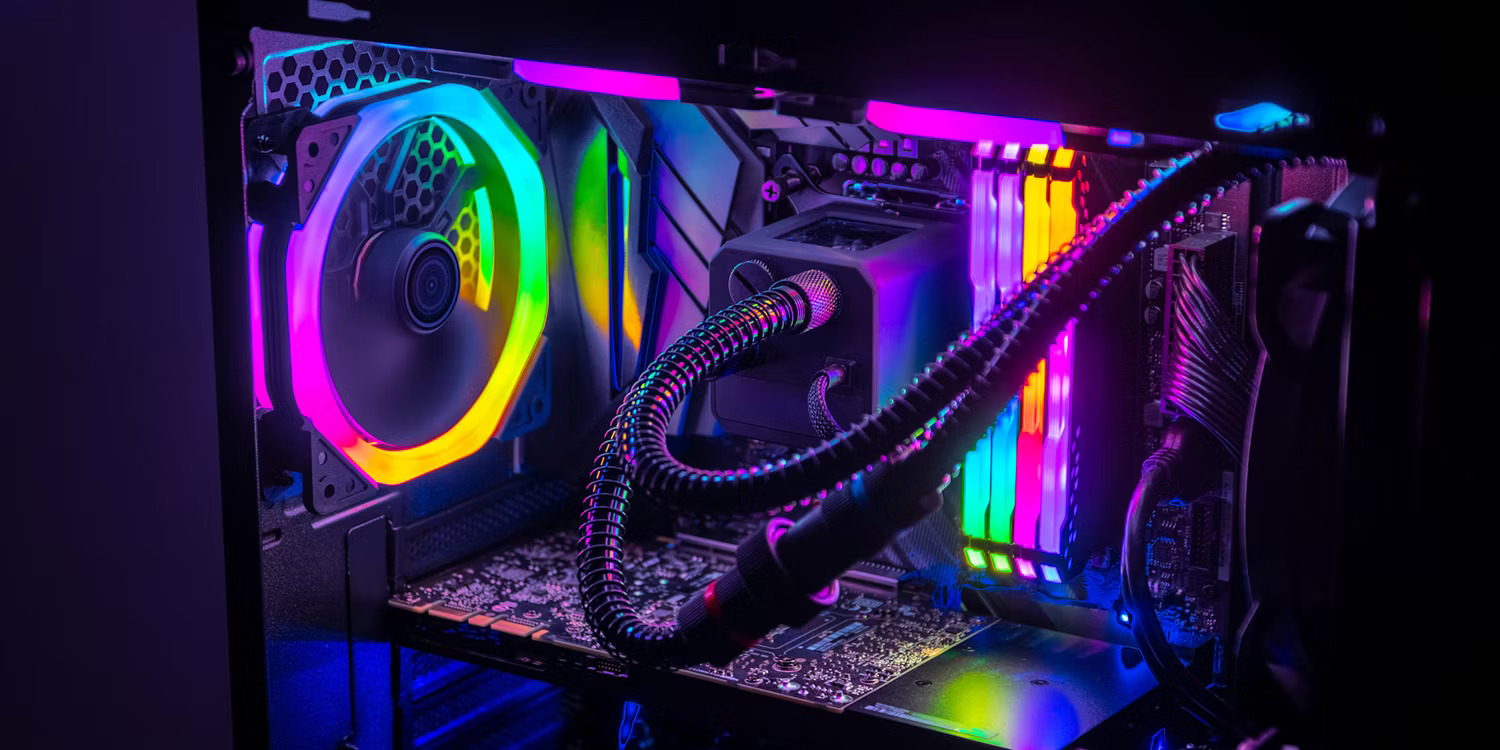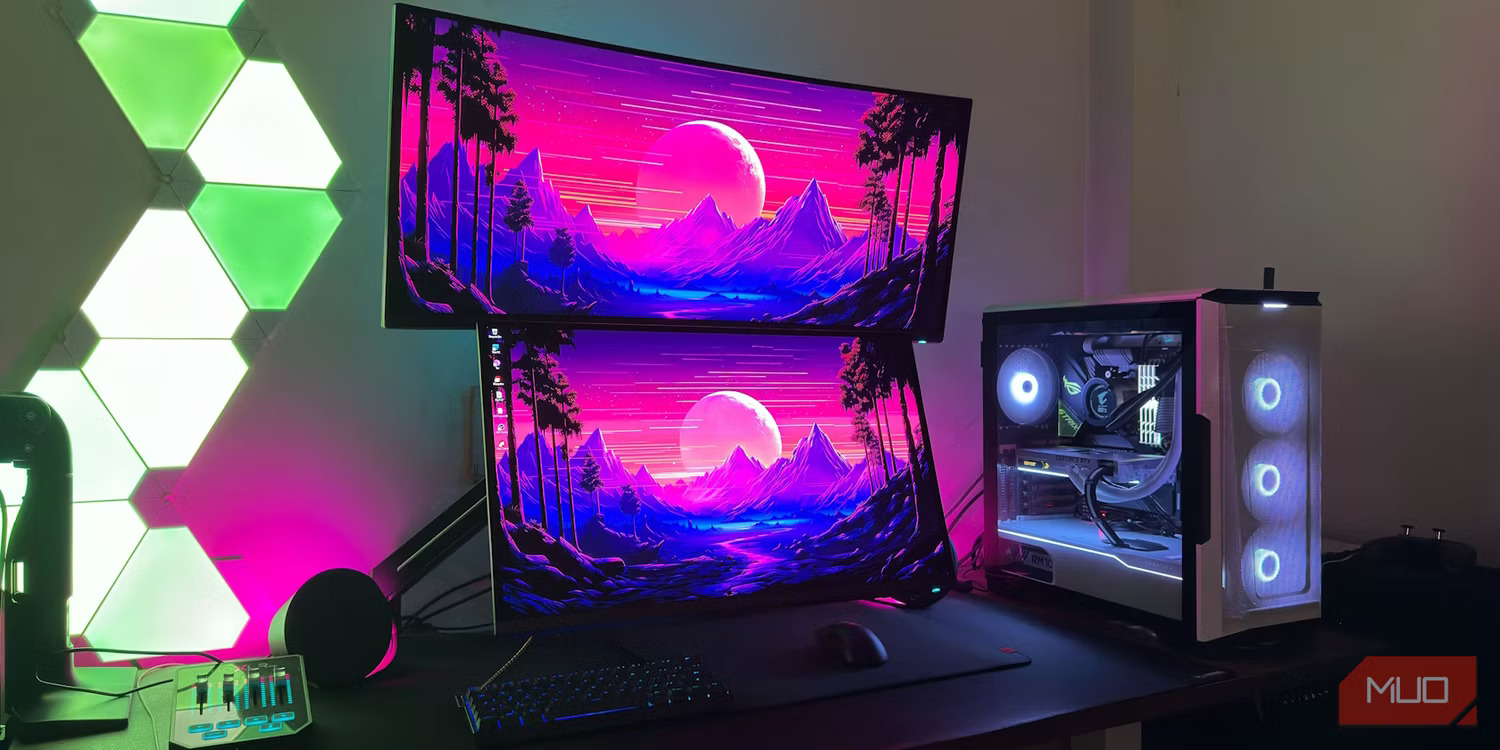The most important components of a gaming PC
Choosing components for a gaming PC can be quite a daunting task. Make sure you get the right parts by identifying key gaming components and how they enhance or affect gaming performance.
1. CPU and GPU

At the heart of any gaming PC are the CPU (Central Processing Unit) and GPU (Graphics Processing Unit). These two components work in tandem to handle the complex calculations and rendering required for gaming.
Depending on the type of game you primarily want to play, prioritizing a better CPU or GPU could be a smart decision if on a tight budget.
Games that perform better with powerful CPUs are often those that rely heavily on physics calculations, artificial intelligence (NPC), and complex simulations. Including:
- Real-time strategy (RTS) games : Titles like StarCraft II or Age of Empires prioritize CPU power for multi-unit processing, AI calculations, and game logic.
- Massively Multiplayer Online Games (MMO) : Games like World of Warcraft or Albion Online benefit from powerful CPU performance to handle player interactions, NPC behavior, and world events.
- Simulator games : Titles like Cities: Skylines or Flight Simulator require powerful CPU performance to simulate detailed environments, traffic, weather, and physics.
On the other hand, games that require better GPU performance rely heavily on rendering and visual effects, such as:
- First-person shooters (FPS) : Games like Call of Duty, Battlefield, or Cyberpunk 2077 prioritize GPU power to render detailed environments, character models, and special effects.
- Open-world games : Titles like Assassin's Creed or Red Dead Redemption require strong GPU performance to render vast, visually impressive landscapes and complex lighting effects.
- Virtual reality (VR) games : VR titles like Half-Life: Alyx or Beat Saber require high GPU performance to maintain smooth frame rates and render vivid 3D environments for the ultimate VR experience pros.
It should be noted that all modern games today require a complete PC for smooth play. So, it is important to strike a balance between both components so as not to experience any bottlenecks while gaming.
When shopping for a CPU, look for models with high clock speeds and multiple cores to ensure smooth gaming and multitasking. For GPUs, look for faster clock speeds, more VRAM, and higher CUDA cores (NVIDIA) or Stream Processors/Compute Units (AMD).
Remember, it's okay to prioritize one component over the other, as long as both the CPU and GPU are operating at the same capacity when gaming.
2. RAM

Both GPU and CPU require fast memory to store temporary data while gaming. GPUs have their own VRAM built-in, while CPUs require a separate RAM component that you will need to purchase and install on your motherboard.
When buying RAM, these are the specifications to check:
- Memory size : Measured in Gigabytes (GB). Indicates the maximum amount of memory that a RAM stick can store.
- Speed : Depending on the manufacturer, RAM speed can be measured in megahertz (MT/s) or megahertz (MHz). Super transfer measures the amount of data RAM can transfer per second, while megahertz measures the frequency or clock speed of RAM.
- DDR generation : DDR (Dual Data Rate) RAM currently has 5 generations. The most common generation of RAM in use today is DDR4, with DDR3 becoming obsolete and DDR5 being adopted on newer PCs. Each generation of RAM has a different number of pins and pin layout. Check which DDR generation your motherboard supports!
Choose at least 16GB RAM to ensure smooth gaming and multitasking. Higher capacities can further improve performance, especially in memory-intensive games or applications.
In terms of speed, you'll want to choose RAM no slower than 3000 MHz/MT/s for a DDR4 compatible motherboard and a RAM speed of at least 5000 Mhz/MTs for DDR5. As long as it doesn't go below 3000 MHz /MT/s for DDR4 and 5000 Mhz/MTs for DDR5, the gaming PC will perform fine.
3. SSD drive
SSD drives have become essential storage for gamers thanks to their fast read and write speeds. With a good SSD, game load times will be significantly reduced, while improving the overall responsiveness of the system.
SSDs can come in many different types, versions, and designs. But for gaming, all that really matters is the amount and type of memory.
There are two types of SSD: SATA and NVMe. SATA (Serial Advanced Technology Attachment) is a standard interface used to connect storage devices such as HDDs and SSDs to the computer's motherboard. While NVMe (Non-Volatile Memory Express) provides better performance using PCIE slots for faster data transfer with lower latency.
Unless you already have a SATA SSD, this article will not recommend using them anymore because the price difference between SATA and NVMe SSDs is negligible. Equip yourself with an NVMe M.2 drive with at least 1 terabyte capacity. It will be faster, easier to install, and cost the same as any SATA SSD available today.
4. Cooling system

Installing high-performance components on a gaming rig will easily cause the device to overheat. To ensure continued gaming for a long time, finding an effective cooling system is essential.
Air cooling solutions, such as off-the-shelf CPU coolers and case fans, provide adequate heat dissipation for most gaming setups. For enthusiasts who push the limits with overclocking or high-performance components, liquid cooling solutions provide superior heat dissipation and quieter operation.
It is recommended to buy an AIO liquid cooler, as it provides better CPU cooling and is relatively easy to install and maintain. When choosing an AIO, consider factors such as radiator size, pump noise, and coolant type when choosing a liquid cooling setup.
As for fans, always make sure to fill all available fan slots in the PC case. Having fewer but larger case fans can make a gaming rig quieter, while having smaller case fans allows for 2 to 5 additional fans that can provide stronger air pressure, although Installation and maintenance are noisier and messier. Of course, if you can afford it, expensive solutions like MagLev PC fans and iCUE LINK are available.
5. The screen has a high refresh rate

A monitor with a high refresh rate can enhance the gaming experience by displaying more frames per second, providing smoother movement and reducing input lag. Aim for a display with a refresh rate of at least 144Hz, although higher refresh rates, such as 240Hz or even 360Hz, are available for those looking for maximum flexibility.
Also look for features like adaptive sync technology (NVIDIA G-SYNC or AMD FreeSync) to eliminate tearing and stuttering for a smooth gaming experience.
6. Other PC parts to consider
In addition to the core components mentioned above, several other parts play an important role in building a gaming PC:
- Motherboards : Select selected CPU, GPU, and RAM support, and offer features like overclocking support, rich connectivity options, and future upgradeability.
- Power Supply : Invest in a reliable power supply unit (PSU) with enough capacity to safely power your components, and consider any potential future upgrades. Make sure the power supply can support all the new components on your gaming rig.
- Case : Choose a case that not only accommodates the selected components but also offers good airflow, cable management, and aesthetics that suit your preferences. The roomy case allows enough room for larger components as well as more case fans, helping to cool the system better.
In short, when building a gaming PC, prioritize the CPU and GPU for raw processing power, supplemented by ample RAM and fast storage for smooth performance. Invest in a powerful cooling system to maintain optimal temperatures, and combine the setup with a high refresh rate display for a truly immersive gaming experience. Finally, consider the compatibility of all components and invest in quality parts to ensure your gaming rig is safe for years to come.